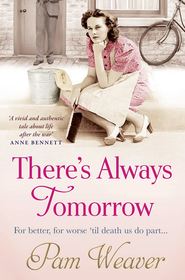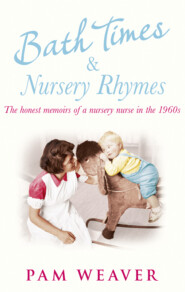По всем вопросам обращайтесь на: info@litportal.ru
(©) 2003-2025.
✖
Pack Up Your Troubles
Автор
Год написания книги
2018
Настройки чтения
Размер шрифта
Высота строк
Поля
‘Are you sure about this Olive, dear?’ Aggie asked.
‘Pen knows what she’s doing,’ Olive snapped.
Aggie poured herself a cup of tea and sat down with one leg swinging as she crossed it over the other. The bee continued to bang itself against the jar until eventually Pen caught its wings with her fingers and put it onto Olive’s swollen knee, holding it there until thoroughly enraged, it stung her. Olive winced. Pen removed the dying bee and eventually the sting it had left behind.
Gwen reappeared at the door. ‘While Mandy is getting changed, I’m going outside for a bit.’
Connie left the three women to watch Ga’s swelling knee and followed her mother outside to where she found her picking runner beans.
‘There’s so much to do this time of year,’ she said matter-of-factly as Connie made a start on the broad beans in the next row. Their smallholding was very popular and the shop was always busy. Their customers knew everything was very fresh, perhaps only just picked. Olive kept the prices down while Gwen did her best to keep the supplies from running out, in between the housework and looking after Mandy. Connie knew how hard her mother’s life was and the unease slipped in.
‘You don’t mind me not working in the nursery, do you Mum?’
‘I’m pleased you’re going to make a career for yourself, dear,’ said Gwen. ‘You’ll make a good nurse.’
‘Ga was a bit cross,’ said Connie. ‘I don’t want to leave you in the lurch.’
‘We’ll be fine,’ said Gwen.
The nursery was hardly making its way when Olive bought it but Clifford was such an excellent nurseryman that he had pulled it back from the brink and made it a going concern. When he was called up in 1943, the two women took over. Gwen used to serve in the shop, but these days she preferred to work on the land, leaving Ga to look after the business side of things. It was never voiced, but the arrangement was so much better since Olive’s knee started playing up. On bad days, Olive could sit in the shop, which was little more than a glorified lean-to, and let the customers serve themselves.
Although the family managed to lift the early potatoes themselves, they generally hired casual labourers to help with the main crop in September. They mostly used the locals because the gypsies didn’t often come this way. When Connie was a child and the gypsies came to Patching, she and Kenneth were invited to share in their communal meal. Connie loved it, especially when Peninnah, Kez’s grandmother, would take her pipe out of her mouth and tell them about the old days. She had an encyclopedic knowledge when it came to family and some of them sounded such wonderful people. ‘They called ’e Red shirt Matthew on account as he always wore a red shirt …’ ‘So they stuffed the two rabbits under ’is big ol’ hat and legged it all the way ’ome …’ ‘She’d stolen ’is trousers, so when ’e got out of the lake, ’e was as naked as the day he were born. He had to walk ’ome without a stitch on ’is back.’ Pen would stop to chuckle. ‘That learned him not to mess about with a gypsy girl …’ Connie and Kenneth would roar their heads off even though they hadn’t a clue who she was talking about. Nobody minded the gypsies being there back then. They were hard workers, the women and children selling handmade pegs and bunches of flowers around the centre of Worthing and the men doing any kind of manual labour on offer.
The war had changed everything. The government had created the Land Army pushing the gypsies further to the fringes of society perhaps, but the hope was that if the powers-that-be disbanded it, farmers would use gypsy labour once again. However, the fate of Kezia and her family was not Connie’s main concern right now. As they worked side by side, she noticed how tired her mother looked.
‘I’m fine,’ said Gwen when Connie remarked on it. ‘I’ve had a bit extra to do with Ga being laid up but things are easing up a bit now. We’ve taken on a local girl to work in the shop, and Clifford will be demobbed soon.’
‘Have you been to the doctor?’
‘Connie, I’m fine,’ Gwen insisted.
Connie knew better than to argue. ‘When’s Clifford coming home?’
‘At the end of the month.’
Connie breathed a silent sigh of relief. With Clifford back, he could take some of the workload off Mum and she could begin her training at the hospital in September as she had planned. She relaxed as she carried on picking. ‘What’s she like?’ Connie asked.
‘Who?’
‘The girl in the shop.’
‘Sally? She’s a bit scatty at times but a good worker,’ said Gwen, her bowl now full. ‘The runner beans have been really good this year.’
Mandy had come out of the house and begun skipping. Connie watched her half-sister and was impressed.
‘She’s only just learned how to do it,’ said Gwen proudly. ‘I think she’s quite good for someone not quite seven, don’t you?’
There was a movement by the back door and Peninnah appeared with Ga. Olive was limping and she had to hold on to the doorposts to keep herself steady but at least she was mobile again. Her leg was heavily bandaged. The two women said their goodbyes and Pen blew a kiss to Mandy.
As she watched her great aunt turn around in the doorway and walk painfully back indoors, Connie turned back to the job in hand. The two boxes were full, one with runner beans and the other with broad beans in the jackets as they headed towards the shop. As they took the supplies inside, Connie met the girl working there.
Sally Burndell was a pretty girl with dark hair and full lips who made no secret of the fact that she was going to go to secretarial college later in the year and was only in the shop for a short while. Connie liked her directness. They arranged the fresh beans underneath the beans already in the boxes to make sure the older beans picked the day before were sold first. Gwen went round picking out failing fruit and vegetables and making sure the supplies were topped up. Connie fetched some fresh newspaper from the storeroom and showed Sally how to make it into bags by folding them a certain way. She also got her to fan out the paper wrapped around the fruit in the orange boxes.
‘Press them flat and put them in a pile,’ said Connie.
‘Whatever for?’ said a voice behind them.
Connie turned to see Aunt Aggie watching them from the doorway.
‘They could be used as toilet paper,’ she said. ‘It’s a lot softer than newspaper. It’s a tip I picked up from the WAAF.’
‘Huh!’ Aunt Aggie scoffed. ‘What’s wrong with newspaper?’
‘I must go in and get the tea,’ said Gwen, wiping her hands on a towel.
‘And I’m off for the bus,’ said Aggie turning to leave. ‘Olive said I could have some beans. Not too many. There’s only me.’
Sally wrapped a few runner beans in newspaper and handed them to her. Aunt Aggie took them without a thank you.
‘See you soon, Aggie,’ Gwen called.
They watched her go.
‘When you’ve got a bum as big as hers,’ Sally said, ‘I guess you’d need a newspaper as big as The Times.’
‘Shh,’ Connie cautioned. ‘She’ll hear you.’ But she and her mother couldn’t help giggling.
Thankfully, Aggie hadn’t heard the remark because she walked on.
‘Play with me, Connie,’ Mandy pleaded as Connie followed her mother outside.
Gwen turned around. ‘No need for you to come into the house,’ she smiled. ‘I’ve made a sausage in cider casserole. All I have to do is take it out of the oven. Stay here and play with Mandy.’
The two sisters grinned. Mandy flicked her plaits over her shoulder and before long, Connie was holding the rope and they were skipping together. Connie hadn’t done this for years. She was a bit out of breath but she hadn’t lost her touch. Pip wandered outside.
‘When I was little,’ she told Mandy, ‘I used to tie the rope on the down-pipe like this and when I turned it, Pip would join in.’
As soon as she said it, and much to Connie’s delight, he joined in. Mandy clapped her hands in delight. By the time their mother called them for tea, she, Pip and Mandy had become great friends.
Three
Teatime over, Connie tucked Mandy up in bed and after a bedtime story they sang her favourite song, ‘You Are My Sunshine’. It was a precious time for both of them and one that Connie had started when her little sister was very young. Every time she’d come home on leave, Mandy had begged her to sing it as she said goodnight. Connie crept out of Mandy’s room and had what her mother would call a cat’s lick in the bathroom and changed her clothes. She put on the pale lemon sweater and same grey pinstriped slacks she had worn in Trafalgar Square and after calling out her goodbyes, headed in the direction of Goring-by-Sea railway station. Pip invited himself along with her, sometimes running on ahead, occasionally stopping to sniff something. She watched him scenting a blade of grass, a telegraph pole and the postbox and marvelled at his carefree love of life.
They reached the Goring crossroad and walked up Titnore Lane. All at once the dog stopped and motionless, sniffed the air, then he took off at breakneck speed. A few minutes later she could hear him in the distance barking joyously. Connie quickened her step and as she rounded a small bend in the lane, she saw them – the gypsies. By now Pip was hysterical with delight, jumping from one to the other, his tail wagging as he let out little yelps of pleasure. Connie was surprised. The dog had only been a puppy when he’d last seen the gypsies but he clearly remembered them.
Connie could pick some of them out even from here. Peninnah Cooper, Kez’s maternal grandmother was stirring something in the black pot hung over an open fire, and was that Kez’s cousin sitting on the caravan steps? Reuben Light, Kez’s father, his frail old body bent low with arthritis and it seemed that he had developed an unhealthy cough. Reuben spotted her and stood up to wave but where was Kez?
Connie recalled how devastated she had been when her mother and Ga moved to Goring in 1938. How would Kez know where she was? Writing a letter was hopeless. For a start, what would she put on the envelope? ‘To the gypsy caravan somewhere near Patching pond in May’ hardly seemed appropriate and besides, Kez couldn’t read. Connie had wept buckets at the injustice of it all, which was why the fact that Kez was just down the road from where she now lived after all this time was so amazing.









